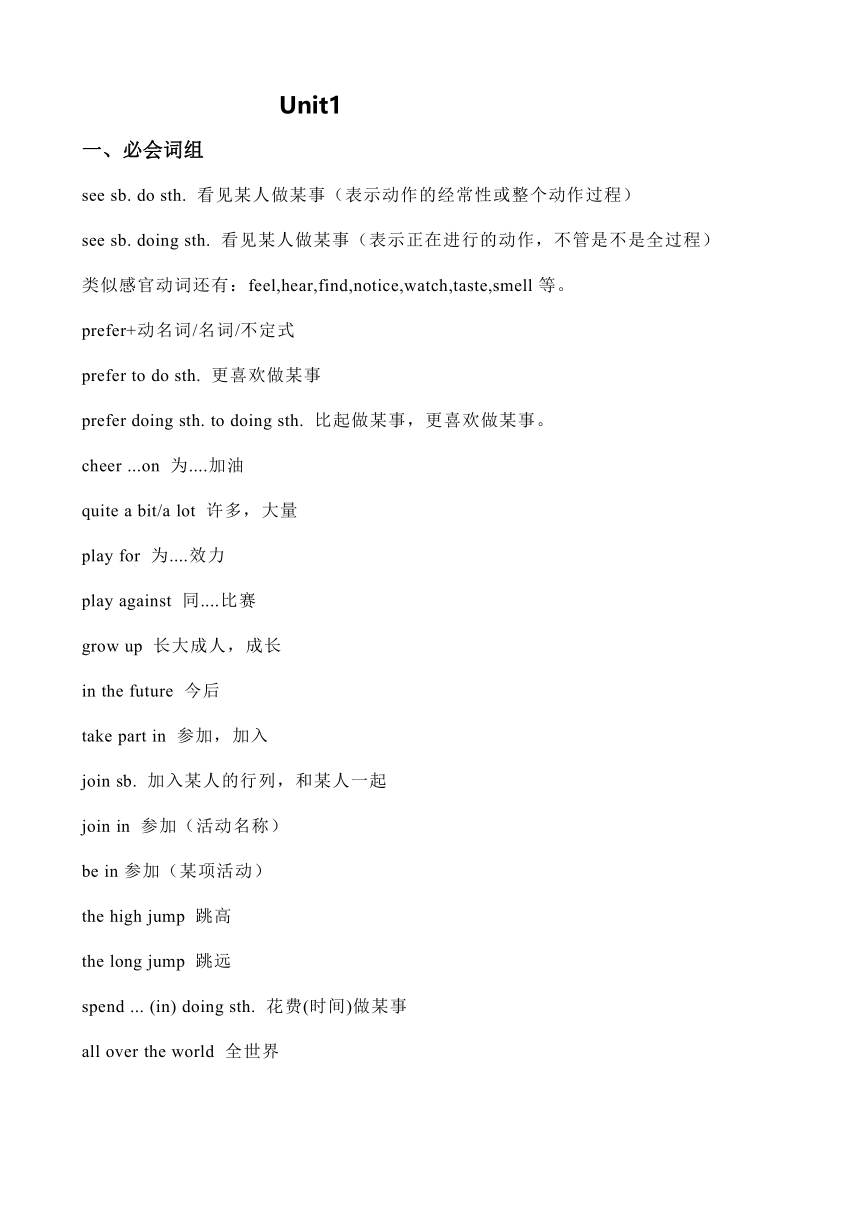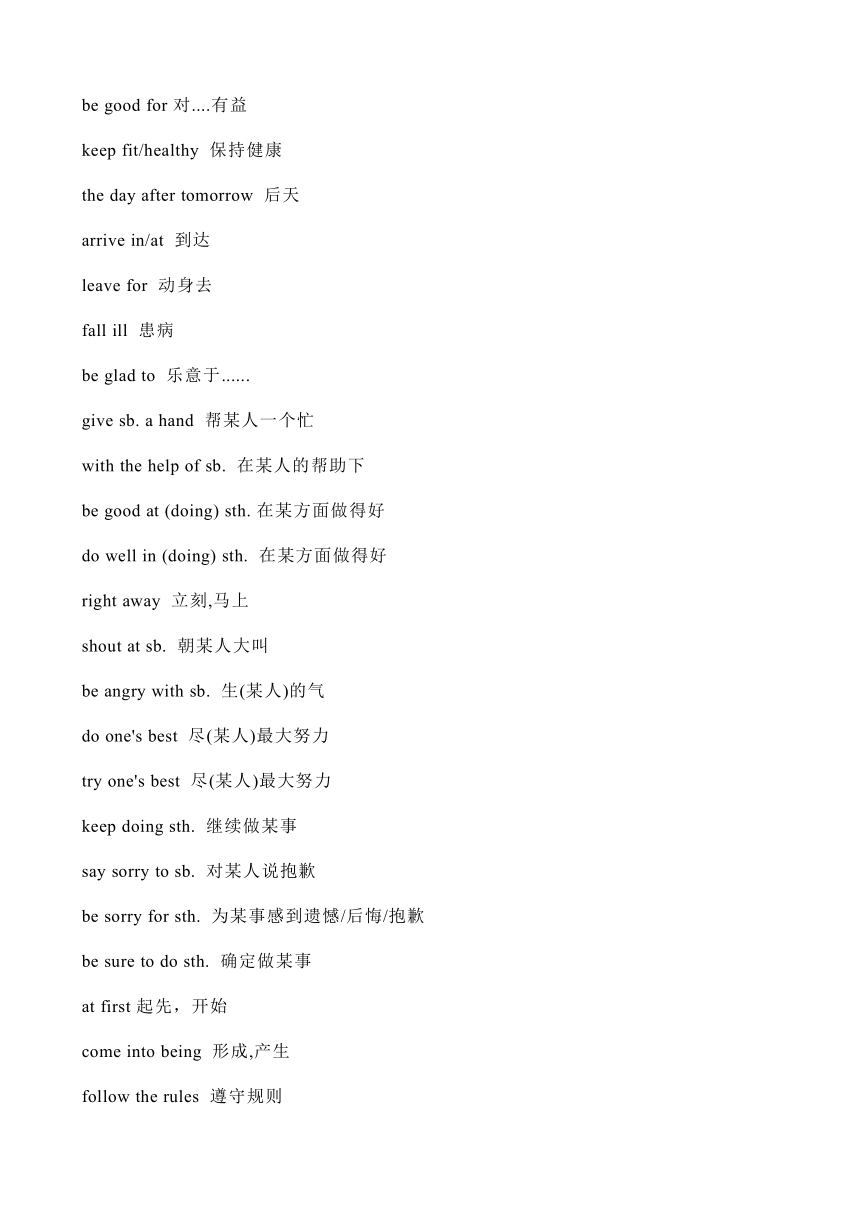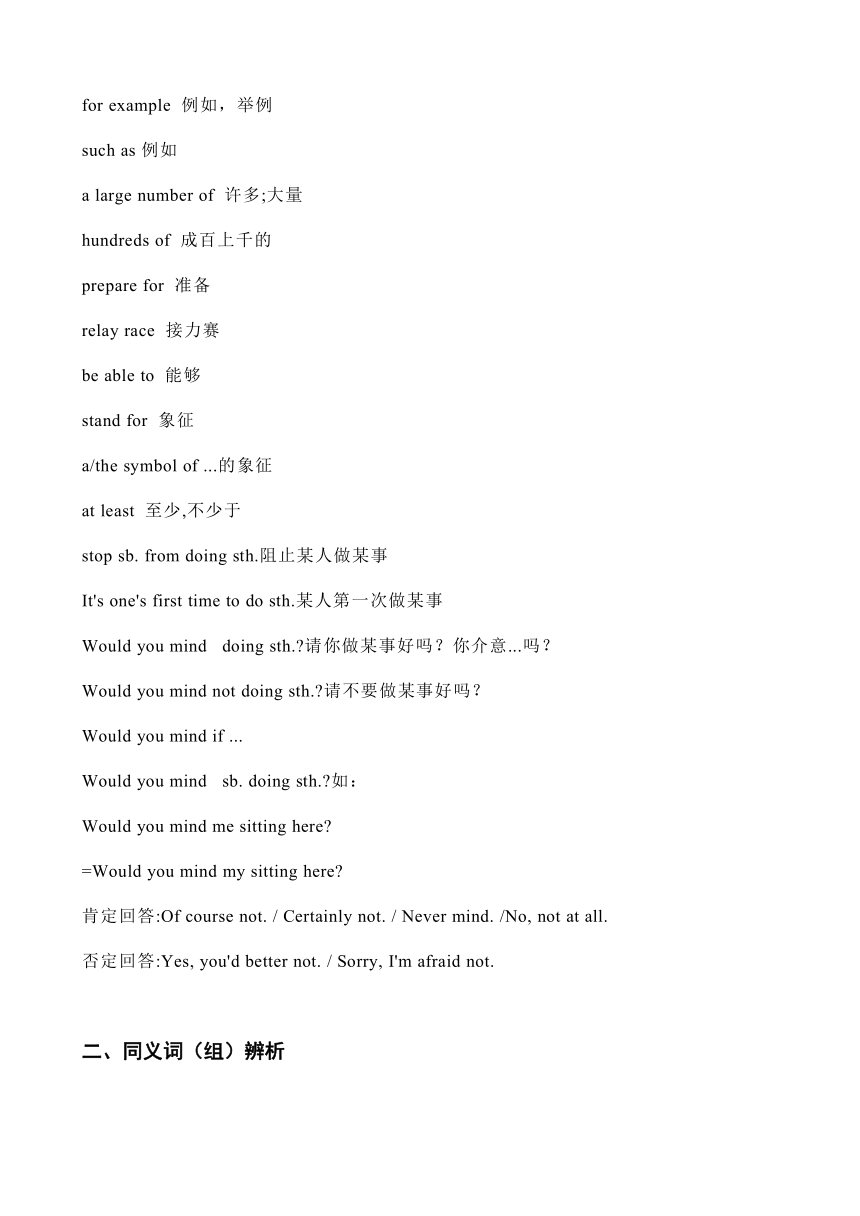Unit 1 Playing Sports必会词组汇总&同义词(组)辨析
文档属性
| 名称 | Unit 1 Playing Sports必会词组汇总&同义词(组)辨析 |  | |
| 格式 | docx | ||
| 文件大小 | 24.5KB | ||
| 资源类型 | 教案 | ||
| 版本资源 | 仁爱科普版 | ||
| 科目 | 英语 | ||
| 更新时间 | 2023-12-16 22:22:53 | ||
图片预览



文档简介
Unit1
一、必会词组
see sb. do sth. 看见某人做某事(表示动作的经常性或整个动作过程)
see sb. doing sth. 看见某人做某事(表示正在进行的动作,不管是不是全过程)
类似感官动词还有:feel,hear,find,notice,watch,taste,smell等。
prefer+动名词/名词/不定式
prefer to do sth. 更喜欢做某事
prefer doing sth. to doing sth. 比起做某事,更喜欢做某事。
cheer ...on 为....加油
quite a bit/a lot 许多,大量
play for 为....效力
play against 同....比赛
grow up 长大成人,成长
in the future 今后
take part in 参加,加入
join sb. 加入某人的行列,和某人一起
join in 参加(活动名称)
be in 参加(某项活动)
the high jump 跳高
the long jump 跳远
spend ... (in) doing sth. 花费(时间)做某事
all over the world 全世界
be good for 对....有益
keep fit/healthy 保持健康
the day after tomorrow 后天
arrive in/at 到达
leave for 动身去
fall ill 患病
be glad to 乐意于......
give sb. a hand 帮某人一个忙
with the help of sb. 在某人的帮助下
be good at (doing) sth. 在某方面做得好
do well in (doing) sth. 在某方面做得好
right away 立刻,马上
shout at sb. 朝某人大叫
be angry with sb. 生(某人)的气
do one's best 尽(某人)最大努力
try one's best 尽(某人)最大努力
keep doing sth. 继续做某事
say sorry to sb. 对某人说抱歉
be sorry for sth. 为某事感到遗憾/后悔/抱歉
be sure to do sth. 确定做某事
at first 起先,开始
come into being 形成,产生
follow the rules 遵守规则
for example 例如,举例
such as 例如
a large number of 许多;大量
hundreds of 成百上千的
prepare for 准备
relay race 接力赛
be able to 能够
stand for 象征
a/the symbol of ...的象征
at least 至少,不少于
stop sb. from doing sth.阻止某人做某事
It's one's first time to do sth.某人第一次做某事
Would you mind doing sth. 请你做某事好吗?你介意...吗?
Would you mind not doing sth. 请不要做某事好吗?
Would you mind if ...
Would you mind sb. doing sth. 如:
Would you mind me sitting here
=Would you mind my sitting here
肯定回答:Of course not. / Certainly not. / Never mind. /No, not at all.
否定回答:Yes, you'd better not. / Sorry, I'm afraid not.
二、同义词(组)辨析
1. play with/play against/play for
(1) Our team will ______ Class Three next Saturday.
(2) A group of kids were _______ a ball in the street.
(3) Does Yi Jianlian ______ the Dallas Mavericks in the NBA
[分析比较]
play with意为“玩耍,游戏,玩乐,与....玩.耍”。(2)题意为“孩子们在玩球”,故填playing wth.
play against意为“同....比赛”。(1)题意为“两个队比赛。”故填play against。
play for意为“为....效力”。(3)题意为“易建联在NBA为达拉斯小牛队打球吗 ”故填play for。
2. arrive in/ arrive at/reach/get to
(1) What time did he ______ the village
(2)At last we _____ the base camp.
(3) You can easily ______the city center from here.
(4)They will ______ Beijing in two days.
[分析比较]
arrive是不及物动词,后常接介词at或in。arrive at+小地点,到达某个具体的地点,如城镇、车站、乡村、建筑物等。(1)题意为“他什么时候到达那个小村庄的 ”故填artive at。
arrive in+大地点,到达某国家或大城市。(4)题意为“他们两天后到达北京。”故填arrive in。
reach意为“到达,抵达",是及物动词,后面直接接宾语,无须介词。(2) 题意为“我们终于到达了大本营。”故填reached。
(3)题意为“从这里你可以不费力地到达市中心。”故填get to。
3. maybe/may be
(1) ______ he is in the library now.
(2) He _______ angry. I think.
[分析比较] maybe 和may be都是“也许,大概”的意思,maybe是副词,常位于句首作状语,句子中还有谓语动词。(1)题意为“也许他在图书馆。”故填Maybe。
may be是“情态动词+be动词”结构,句中没有其他谓语。(2)题意为“他可能生气了,我觉得。”maybe在句中作谓语。故填may be。
4. leave/leave for/ leave... for
(1) He ______ his hometown last week.
(2) I am ______New York next week to see my good friends there.
(3) We will _____Beijing _____Shanghai.
[分析比较] leave 常用作动词,表示go away ( from)“离开”,leave a place是指“离开某地”。(1)题意为“他上周离开了家乡。”故填leave的过去式left。
leave for+地点名词,表示“动身.....前往....” (2)中由不定式所表达的意思可知,下周我要去纽约。故填leaving for。
leave A for B,意为“离开A地去B地”。(3)题意为“我们准备离开北京去上海。”故填leave ... for。
5. turn on/ turn off/ turn up/ turn down/ close/open
(1)- Paul, could you please ________the TV a little It's too noisy. - Sorry, I'll do it right now.
(2) ______ the lights when you leave.
(3) ______ the TV. Let's watch the play together.
(4) _______ your mouth, and say “Ah”.
(5) The music was _______loud and they danced crazily.
(6) I _______ my eyes against the bright light.
[分析比较]
turn on与turn off为反义词组,turn on打开,接通(电源、煤气水等);tum off关掉,切断(电源煤气、水等)。
turn up与turn down为反义词组,turn up开大,调高(音量热量等) ;turn down把....调低,关小。
close与open为反义词,close闭上,关,关闭(门窗、盒子等);open开,打开,开启(门、窗、盒子等)。
(1)题由It's too noisy.和a little可知应填turn down;
(2)题由“离开时要关灯”可知应填Turn off;
(3)题由“让咱们一起看电视剧吧”可知应填Turn on;
(4) 题意为“张开嘴巴”。故填Open;
(5)题由loud以及“他们疯狂地跳起舞来”可知,音乐被开大了。故填turned up;
(6)题由“以防强光的照射”可知,应是闭上眼睛。故填close。
6. shout at/shout to
(1) The children _______ the driver, but he did not hear them.
(2) If you don't stop _______me, I'll come and hit you.
(分析比较]at和to与同一动词搭配时,意义有很大的区别。
shout to sb.意为“大声叫某人”,多因距离远,声音小而听不见。(1)题意为“孩子们对着司机喊叫着,但是他没听见。”故填shouted to。
shout at sb.则表示”生气地或故意地对某人大喊大叫。”(2)题意为“你要是不停止冲着我叫嚷,我就过去揍你。”故填shouting at。
一、必会词组
see sb. do sth. 看见某人做某事(表示动作的经常性或整个动作过程)
see sb. doing sth. 看见某人做某事(表示正在进行的动作,不管是不是全过程)
类似感官动词还有:feel,hear,find,notice,watch,taste,smell等。
prefer+动名词/名词/不定式
prefer to do sth. 更喜欢做某事
prefer doing sth. to doing sth. 比起做某事,更喜欢做某事。
cheer ...on 为....加油
quite a bit/a lot 许多,大量
play for 为....效力
play against 同....比赛
grow up 长大成人,成长
in the future 今后
take part in 参加,加入
join sb. 加入某人的行列,和某人一起
join in 参加(活动名称)
be in 参加(某项活动)
the high jump 跳高
the long jump 跳远
spend ... (in) doing sth. 花费(时间)做某事
all over the world 全世界
be good for 对....有益
keep fit/healthy 保持健康
the day after tomorrow 后天
arrive in/at 到达
leave for 动身去
fall ill 患病
be glad to 乐意于......
give sb. a hand 帮某人一个忙
with the help of sb. 在某人的帮助下
be good at (doing) sth. 在某方面做得好
do well in (doing) sth. 在某方面做得好
right away 立刻,马上
shout at sb. 朝某人大叫
be angry with sb. 生(某人)的气
do one's best 尽(某人)最大努力
try one's best 尽(某人)最大努力
keep doing sth. 继续做某事
say sorry to sb. 对某人说抱歉
be sorry for sth. 为某事感到遗憾/后悔/抱歉
be sure to do sth. 确定做某事
at first 起先,开始
come into being 形成,产生
follow the rules 遵守规则
for example 例如,举例
such as 例如
a large number of 许多;大量
hundreds of 成百上千的
prepare for 准备
relay race 接力赛
be able to 能够
stand for 象征
a/the symbol of ...的象征
at least 至少,不少于
stop sb. from doing sth.阻止某人做某事
It's one's first time to do sth.某人第一次做某事
Would you mind doing sth. 请你做某事好吗?你介意...吗?
Would you mind not doing sth. 请不要做某事好吗?
Would you mind if ...
Would you mind sb. doing sth. 如:
Would you mind me sitting here
=Would you mind my sitting here
肯定回答:Of course not. / Certainly not. / Never mind. /No, not at all.
否定回答:Yes, you'd better not. / Sorry, I'm afraid not.
二、同义词(组)辨析
1. play with/play against/play for
(1) Our team will ______ Class Three next Saturday.
(2) A group of kids were _______ a ball in the street.
(3) Does Yi Jianlian ______ the Dallas Mavericks in the NBA
[分析比较]
play with意为“玩耍,游戏,玩乐,与....玩.耍”。(2)题意为“孩子们在玩球”,故填playing wth.
play against意为“同....比赛”。(1)题意为“两个队比赛。”故填play against。
play for意为“为....效力”。(3)题意为“易建联在NBA为达拉斯小牛队打球吗 ”故填play for。
2. arrive in/ arrive at/reach/get to
(1) What time did he ______ the village
(2)At last we _____ the base camp.
(3) You can easily ______the city center from here.
(4)They will ______ Beijing in two days.
[分析比较]
arrive是不及物动词,后常接介词at或in。arrive at+小地点,到达某个具体的地点,如城镇、车站、乡村、建筑物等。(1)题意为“他什么时候到达那个小村庄的 ”故填artive at。
arrive in+大地点,到达某国家或大城市。(4)题意为“他们两天后到达北京。”故填arrive in。
reach意为“到达,抵达",是及物动词,后面直接接宾语,无须介词。(2) 题意为“我们终于到达了大本营。”故填reached。
(3)题意为“从这里你可以不费力地到达市中心。”故填get to。
3. maybe/may be
(1) ______ he is in the library now.
(2) He _______ angry. I think.
[分析比较] maybe 和may be都是“也许,大概”的意思,maybe是副词,常位于句首作状语,句子中还有谓语动词。(1)题意为“也许他在图书馆。”故填Maybe。
may be是“情态动词+be动词”结构,句中没有其他谓语。(2)题意为“他可能生气了,我觉得。”maybe在句中作谓语。故填may be。
4. leave/leave for/ leave... for
(1) He ______ his hometown last week.
(2) I am ______New York next week to see my good friends there.
(3) We will _____Beijing _____Shanghai.
[分析比较] leave 常用作动词,表示go away ( from)“离开”,leave a place是指“离开某地”。(1)题意为“他上周离开了家乡。”故填leave的过去式left。
leave for+地点名词,表示“动身.....前往....” (2)中由不定式所表达的意思可知,下周我要去纽约。故填leaving for。
leave A for B,意为“离开A地去B地”。(3)题意为“我们准备离开北京去上海。”故填leave ... for。
5. turn on/ turn off/ turn up/ turn down/ close/open
(1)- Paul, could you please ________the TV a little It's too noisy. - Sorry, I'll do it right now.
(2) ______ the lights when you leave.
(3) ______ the TV. Let's watch the play together.
(4) _______ your mouth, and say “Ah”.
(5) The music was _______loud and they danced crazily.
(6) I _______ my eyes against the bright light.
[分析比较]
turn on与turn off为反义词组,turn on打开,接通(电源、煤气水等);tum off关掉,切断(电源煤气、水等)。
turn up与turn down为反义词组,turn up开大,调高(音量热量等) ;turn down把....调低,关小。
close与open为反义词,close闭上,关,关闭(门窗、盒子等);open开,打开,开启(门、窗、盒子等)。
(1)题由It's too noisy.和a little可知应填turn down;
(2)题由“离开时要关灯”可知应填Turn off;
(3)题由“让咱们一起看电视剧吧”可知应填Turn on;
(4) 题意为“张开嘴巴”。故填Open;
(5)题由loud以及“他们疯狂地跳起舞来”可知,音乐被开大了。故填turned up;
(6)题由“以防强光的照射”可知,应是闭上眼睛。故填close。
6. shout at/shout to
(1) The children _______ the driver, but he did not hear them.
(2) If you don't stop _______me, I'll come and hit you.
(分析比较]at和to与同一动词搭配时,意义有很大的区别。
shout to sb.意为“大声叫某人”,多因距离远,声音小而听不见。(1)题意为“孩子们对着司机喊叫着,但是他没听见。”故填shouted to。
shout at sb.则表示”生气地或故意地对某人大喊大叫。”(2)题意为“你要是不停止冲着我叫嚷,我就过去揍你。”故填shouting at。
同课章节目录
- Unit 1 Playing Sports
- Topic 1 I'm going to play basketball.
- Topic 2 I'll kick you the ball again.
- Topic 3 The school sports meet is coming.
- Unit 2 Keeping Healthy
- Topic 1 You should brush your teeth twice a day.
- Topic 2 I must ask him to give up smoking.
- Topic 3 Must we exercise to prevent the flu?
- Unit 3 Our Hobbies
- Topic 1 What's your hobby?
- Topic 2 What sweet music!
- Topic 3 What were you doing at this time yesterday
- Unit 4 Our World
- Topic 1 What's the strongest animal on the farm?
- Topic 2 How can we protect ourselves from the eart
- Topic 3 The Internet makes the world smaller.
